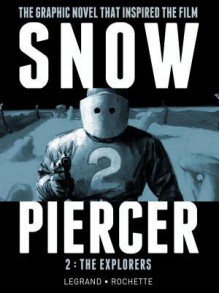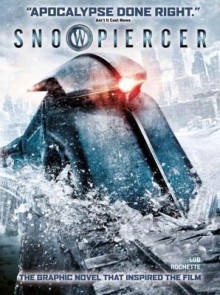

Snowpiercer Volume 2 is a bit of a misnomer, because it actually contains Volumes 2 and 3 of the story. It takes places after the first book, on another Snowpiercer train which having lost contact with the first one after the events of the last book, lives in fear of a collision with it.
The book was better than the first and it has more in common with the movie than that one. But I don't think I would read it again. Again, some good ideas, but not my type of book.
Recently saw Snowpiercer. The whole time I'm watching it certain parts of these books kept coming to my mind.
So if you've seen Snowpiercer you might like these two books.
INSIDE OUT by Maria V. Snyder (this one is YA)
WOOL OMNIBUS by Hugh Howey
If you've read these books and liked them, you might like Chris Evans in Snowpiercer.
I loved Tilda Swinton!
The movie was based on the French Graphic novel Le Transperceneige written by Jacques Lob and Jean-Marc Rochette.
"Know your place. Keep your place. Be a shoe."

One of the rare cases of the movie is better than the book. I did try read the book first, but my library had few copies and the line was long. I did really like the movie and recommend it.
The book, I'm more mixed on. Although, for whatever reason I have the second one on hold (and it's already available, weird how that happens).
I love the concept, which the movie kept. The world is in perpetual winter and a never stopping train carries the rest of humanity. The book did explain a bit more about how the train came about, which I enjoyed. But honestly, I cannot even tell you how it ended. I remember a few bits and pieces of the storyline, a person from the tail of the train tries to make his way up the train and is caught. A person from the middle of the train who wants more equality for everyone tries to help him, and for whatever reason, they are both called to the front of the train, which is a long trek.
But yeah, no memory of how it ended. Hopefully the second book will have a recap.
Panellists: Martin McGrath, Carrie Vaughn, Roz J. Kaveney (GR),Takayuki Tatsumi, Laurie Penny
One of the defining political issues of our time, societal inequality is showing up on-screen in films like In Time, Elysium and The Dark Knight Rises, and TV shows such as Continuum and Arrow. How successfully do these works engage with the issues they raise? Is the imagery they use at odds with the narratives they follow? And what would radical anti-inequality SF look like?
Why does SF hate poor people? It seems to echo the media’s hate for the poor.